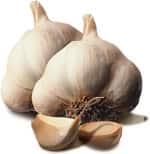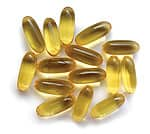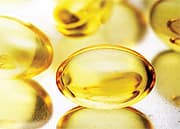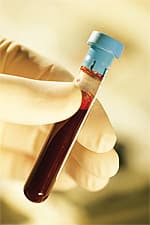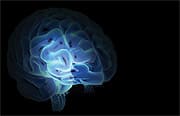Life Extension Magazine®
 | |
Meta-Analysis Adds Evidence to Association Between Omega-3 Supplementation and Homocysteine Reduction | |
The outcome of a meta-analysis of 11 trials published in the journal Nutrition uncovered a significant reduction in plasma homocysteine in association with greater intake of omega-3 polyunsaturated fatty acids.* Researchers in China pooled the results from 702 participants in randomized trials that compared the effects of supplementation with omega-3 fatty acids to a placebo. Treatment periods ranged from 6 to 48 weeks, and doses varied between 0.2 and 6 grams per day. The analysis confirmed a reduction in plasma homocysteine levels in association with omega-3 fatty acid supplementation, with an average decrease of 1.59 micromoles per liter experienced by those who supplemented compared to those who received a placebo. “Our systematic review provides, to our knowledge, the most comprehensive assessment to date of the effects of omega-3 polyunsaturated fatty acids on plasma homocysteine,” the authors announce. Editor’s Note: The authors suggest modulation of gene expression of enzymes involved in the formation and metabolism of plasma homocysteine as a possible mechanism of action for omega-3. —D. Dye | |
| Reference | |
| * Nutrition. 2011 Sep;27(9):863-7. | |
Green Tea Intake Shows Protective Effect Against Flu | |
| In addition to ensuring optimal intake of vitamins C and D during the upcoming flu season, it may be wise to regularly indulge in a soothing pot of green tea, according to the results of a Japanese study published in the Journal of Nutrition.* Researchers at the University of Shizuoka conducted surveys of 2,050 pupils during influenza season from 2008 to 2009. The responses provided information concerning the quantity of green tea intake, preventive measures taken against influenza, and the incidence and duration of infections. Among children who reported drinking tea at least six days per week there was a 40% lower risk of being diagnosed with influenza compared to those who consumed tea fewer than three days per week. Subjects who consumed three to five cups per day had a 46% lower risk of contracting flu in comparison with those who consumed less than one cup daily. Editor’s Note: “Contrary to the results of green tea consumption, general preventive measures (such as influenza vaccination, hand hygiene, and the use of facemasks) were not associated with the incidence of influenza infection,” the authors remark. —D. Dye | |
| Reference | |
| * J Nutr. 2011 Aug 10. | |
CoQ10 Levels Reduced in Septic Shock | |
An article published in the journal Critical Care documents the finding of decreased levels of coenzyme Q10 (CoQ10) in patients with septic shock.* Harvard researchers utilized data from 14 patients with septic shock who participated in a placebo-controlled trial of statin drugs. Blood samples drawn from the septic patients prior to treatment and from 16 healthy controls were analyzed for coenzyme Q10, low-density lipoprotein (LDL), and vascular endothelial and inflammatory markers. While the control group had a median CoQ10 level of 0.95 micromoles per liter, which is similar to levels previously measured in healthy patients, the median baseline level for those with septic shock was 0.49 micromoles/liter. Higher CoQ10 levels were associated with lower levels of vascular endothelial biomarkers and inflammatory cytokines, although only vascular cell adhesion molecule (VCAM) and interleukin-10 remained lower following the adjusted analysis. Editor’s Note: Sepsis is an inflammatory state resulting from the spread of infectious agents in the bloodstream. Sepsis and septic shock are major causes of illness and mortality in the US, with over 215,000 deaths occurring each year. —D. Dye | |
| Reference | |
| * Crit Care. 2011 Aug 9;15(4):R189. | |
Omega-3 Users Are Different | |
The International Conference on Alzheimer’s Disease was the site of a presentation by Lori Daiello, Pharm.D. of the finding of differences in brain structure between individuals who supplement with fish oil and those who do not.* The current study included 819 participants in the Alzheimer’s Disease Neuroimaging Initiative, which conducted periodic brain magnetic resonance imaging and memory testing on older adults with normal cognitive function, mild cognitive impairment and Alzheimer’s disease over a three year period. Dr. Daiello and her colleagues compared data obtained from 117 men and women who reported regular fish oil supplement use with data from 702 nonusers. The team found greater brain volume and better cognitive function over follow-up in fish oil users who did not test positive for the APOE4 gene, which is a risk factor for Alzheimer’s disease. “In other words, fish oil use was associated with less brain shrinkage,” Dr. Daiello stated. Editor’s Note: Fish oil contains the omega-3 fatty acids eicosapentaenoic acid (EPA) and docosahexaenoic acid (DHA), which have been associated with improved cognitive function. —D. Dye | |
| Reference | |
| * Alzheimer’s Association 2011 International Conference on Alzheimer’s Disease, July 16-21, 2011, Paris. | |
Saffron Prevents Liver Cancer in Animal Model | |
| In the journal Hepatology, Arab researchers report a protective effect for saffron against cancer of the liver in rats.* Amr Amin and colleagues divided 48 rats into six groups. Liver tumors were induced in four of the groups by the administration of DEN, a potent carcinogen. While one group given DEN received no additional treatment, the three other groups received varying doses of saffron beginning two weeks prior to injection with the carcinogen. Rats that were not treated with DEN were given water or saffron throughout the course of the 20-week study. Among rats that received the carcinogen, fewer of the saffron-treated animals had liver masses at the end of the treatment period in comparison with rats that were not pretreated, and the number of nodules detected was lower. No nodules were found in the rats that received the highest dose of saffron. Editor’s Note: In separate experiments in cultured liver cancer cells, the administration of saffron was shown to arrest growth and increase programmed cell death. —D. Dye | |
| Reference | |
| * Hepatology. 2011 May 23. | |
Omega-3 Fatty Acid Protects Brain from Severe Stroke Damage | |
In an article published in the journal Stroke, researchers at Université Laval Quebec report that the administration of the omega-3 fatty acid docosahexaenoic acid (DHA), which occurs in fish oil, reduces damage caused by stroke in an animal model.* The team gave male mice a diet supplemented with DHA, a diet deficient in omega-3 fatty acids, or a control diet for three months. Stroke was induced by middle cerebral artery occlusion, and the size of the damaged areas was assessed. Blood samples were analyzed for markers of inflammation and other factors. Mice that were treated with DHA had areas of ischemic damage that were 25% smaller and higher levels of a molecule that prevents programmed cell death compared with the other groups. The DHA-treated animals also had lower levels of the inflammatory markers COX-2 and interleukin-1, as well as a higher ratio of omega-3 to omega-6 fatty acid levels. Editor’s Note: Co-author Frédéric Calon observed that “Since DHA is readily available, inexpensive, and reduces the risk of a number of health problems without causing significant side effects, the risk:benefit ratio tends to favor the regular consumption of fish or DHA.” —D. Dye | |
| Reference | |
| * Stroke. 2011 Aug 18. |


